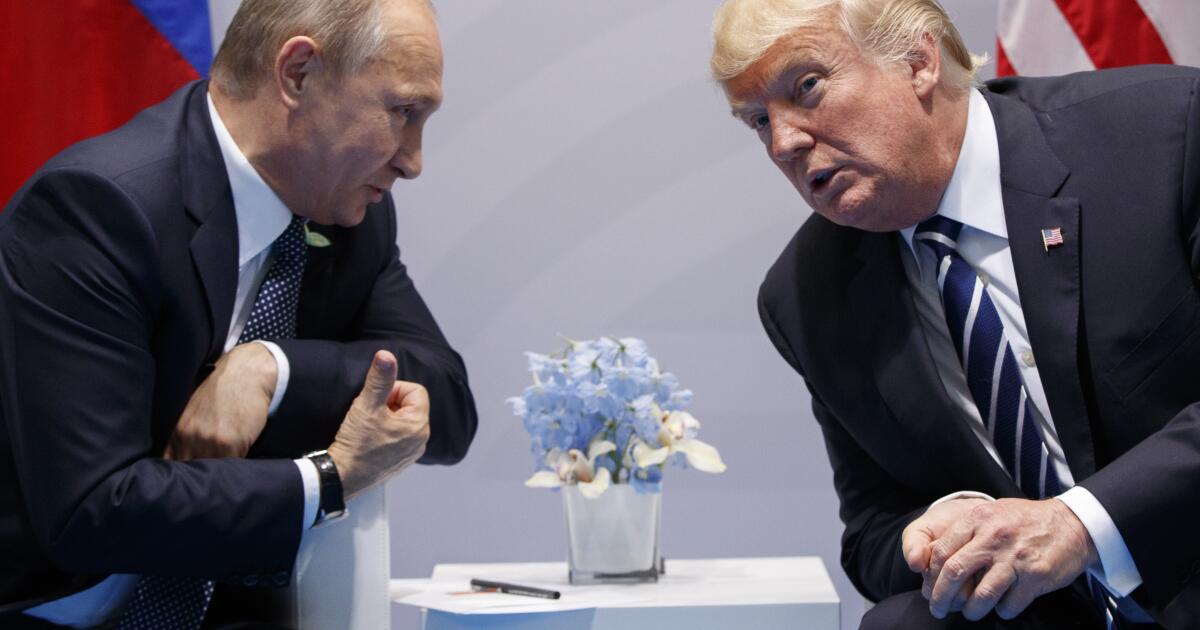Once again, Donald Trump is talking about his candidacy as if he doesn’t have a presidency we can refer to.
This time the topic is the construction of Nord Stream 2, a controversial gas pipeline between Russia and Germany. For years members of both parties had opposed Nord Stream 2, fearing it would increase Europe’s dependency on Russia for energy. As president, Trump imposed sanctions on the company building the pipeline in December 2019, with the State Department saying the pipeline “is a tool Russia is using to support its continued aggression against Ukraine.”
President Biden waived those sanctions in 2021, and Trump is using that decision to criticize his vice president, Kamala Harris.
It is true that Biden lifted sanctions, in part to repair the U.S. relationship with Germany, which was strained under Trump. But Biden also did it because the pipeline was 90% completed when he took office. Trump’s on the trail saying he stopped the pipeline from happening, but the truth is most of it was built during his time in the White House. Moreover, construction on the pipeline resumed in 2020 despite his 2019 sanctions. And Biden imposed a new round of sanctions in 2022.
The real question isn’t why Biden lifted the sanctions in 2021, but rather why did Trump wait until the end of 2019 to act?
The answers lie in the pages of the Mueller report, which investigated interference in the 2016 election.
In December 2013, the Trump Organization entered a branding agreement for residential property in Moscow that would have netted Trump close to $20 million.
In February 2014, Russia invaded Ukraine and annexed Crimea.
In March, the United States along with our allies responded with crippling economic sanctions. As a result, Russia’s economy cratered, and Trump’s 2013 deal fell off.
However, Russia’s invasion added to the laundry list of criticisms regarding the foreign policy decisions of President Obama and by extension Secretary of State Hillary Clinton. As the primary season rolled on in 2015, the attacks became part of GOP debates.
That November, during the fourth installment, when asked, “What does ‘President Trump’ do in response to Russia’s aggression?” the first thing Trump said was: “Well first of all, it’s not only Russia.”
He then brought up North Korea, Iran and China.
When Trump finally said Russian President Vladimir Putin’s name, he first talked about their time together in a “60 Minutes” green room before voicing support for Russia’s growing influence in the Middle East.
Today on the campaign trail, Trump talks tough about Russia. But as a private citizen, he tried to do business in Moscow even after Putin invaded Ukraine. And on that 2015 debate stage, Trump did not denounce Putin’s actions in Ukraine. Perhaps it was because Trump had signed a new property deal for a tower in Moscow the week before.
In fact, he signed the letter of intent the day of the third GOP debate. He spoke less than six minutes on stage that night, and his lack of courage about Russia didn’t end there.
While president in July 2018, Trump stood next to Putin in Helsinki and refused to confront him about interfering in the 2016 election. To the contrary, Trump took Putin’s side and questioned U.S. intelligence. Then later that year, Russia captured three Ukranian navy vessels and 23 sailors. Most notably, it was the first time Putin’s government fired weapons at Ukraine. The incident sent shock waves around the world as leaders quickly denounced Putin’s act of aggression on social media.
However, Trump was not among them.
More than a full day would go by before the leader of the free world told reporters he wasn’t happy about Putin’s aggression “and hopefully it will get straightened out.”
Obama underestimated Putin in 2012. During his debate against Mitt Romney, the GOP nominee said Russia was the country’s top geopolitical foe. Obama mocked him, saying, the “1980s are now calling to ask for their foreign policy back, because the Cold War’s been over for 20 years.”
Perhaps for America, that was true.
But for Putin the war never ended, and Romney recognized that.
Concerns regarding Russia’s influence over Europe’s energy were realized back in 2006, after Ukraine welcomed a Western-friendly president. Putin quadrupled Ukraine’s fee for natural gas. When Ukraine balked, Putin shut off the nation’s gas supply in the dead of winter. At the time, the pipelines through Ukraine carried roughly 80% of Russia’s gas to Europe. So, when Putin shut the gas off the morning of Orthodox Christmas in 2009 — again because of his anger at Ukraine — more than 10 European countries suffered.
Trump cannot be allowed to rewrite this critical period of history because the consequences would be dire.
Yes, Russia annexed Crimea under Obama. Yes, Russia invaded Ukraine under Biden. But the first Russian bullet in this war was fired while Trump was in office, and he said, “Hopefully it will get straightened out.” The national security risks with that kind of wishful thinking cannot be overstated.
If Ukraine falls, Putin will control about a third of the world’s wheat production and more than 60% of sunflower seed oil, which is used in countless food products. The Middle East and Africa depend largely on Ukraine for grains. Do we really think Putin, with his history of shutting off gas to punish democracies, would hesitate to weaponize food security as well?
The notion that candidate Trump would be tough on Putin in that moment is laughable. Trump had his chances, and we saw how weak he was.
@LZGranderson
